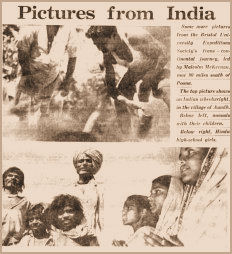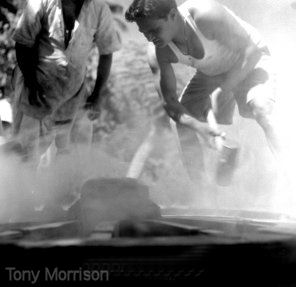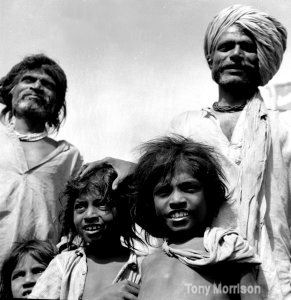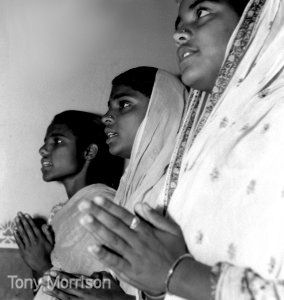University
of Bristol Trans-Continental Expedition 1960 — 61 | ||||||||
| ||||||||
| Published Saturday March 11th 1961 | ||||||||
It was a day-long ceremony to celebrate the establishment of the Block Development Scheme in the sub-district of Koregaon. This marks a stage of economic growth when development plans have been approved and government officers and technical advisers have been appointed to help the people achieve them. Day-long meeting The accent is always on educating the people to understand and attempt the new methods, and persuading them to form co-operatives which can then receive assistance in carrying out the work. The ceremonies were in three parts. First, the welcoming of the State Minister of Agriculture and Power, who was to preside. We were introduced to him and had lunch with the officials, Hindu style, a vegetarian meal eaten crosslegged (ouch!) on the floor and using the fingers. In the afternoon was the village meeting. We were escorted to the platform, an eminence we scarcely deserved. Here we sat in state on silken cushions, watching the banners fluttering and listening to the songs of greeting from the schoolchildren. The purpose of the meeting was to give an impetus to the Block Development work, and to explain work it entailed. Then prizes were presented to the benefits of the system and those who had conceived and carried out ideas for the improvement of their villages. This work had been voluntary and unpaid. The ceremonies ended with a Hindu drama. It was hoped during the next two months to achieve an elementary standard of literacy in the age-group 14-40. Classes were held at night, after all the day’s work had been done, and many groups of adults sat with slates under paraffin lamps, being instructed by the already proficient some of whom, naturally, were schoolchildren. We saw a small girl of 12 or 13 instructing a group of nine adults. It was often necessary to divide our strength, otherwise the work could not be done. One day from the diary reads as follows (in extracts): December 20: Up at seven, Tony and Peter to Pusegaon early. Tony wants to film sugar cane cutting and to include Mr Jogiekar (from the Gokhale Institute) as demonstrator. Mark carrying out routine work on second vehicle, cleaning oil filter and fitting new wheel bearing. Car ready 10.30. Mark, Roger and self to Pusegaon. Peter and Roger go with Mr Jogiekar to visit his landlord’s farm. Mark and Tony work in school, taking photographs of children at work, cine and stills, and sound recordings on our portable tape recorder of lessons and songs. I get information from Mr Patil (the headmaster) about history and working of the society which runs his school, the Rayat Shikshan Sanstha (Peasant Education Society). Tea and bread No time to return for lunch; eat tea and bread. In afternoon Peter and Roger return to Koregaon to visit Co-operative factory organised by Mr Doshi (whom we met last week at the Satara Rotary Club). Very interesting project, Mr Doshi has provided 22 machines, mainly lathes, and finds work to keep them going mainly finishing castings for big firms who make ploughs, small electric motors, etc. Workers are paid the value of the products less a small commission for organisation. Some of their money is put aside until they have "bought" and own their machine. Encourages saving and pride in work; also results in much larger wages than the factories and provides local employment. Tony Mark and self to Aundh (13 miles away) to take up engagement made at time when we lived there. We take photographs and cine film of the schoolchildren’s parade, dancers and gymnastics. A little too regimented for our liking. Saw Curator of Aundh Museum where we want to take photographs, talked with him about local customs and entertainments. In the evening we have arranged to give school short show of colour slides. Arranged for 6.30 – when the electricity comes on! but this is "Indian" as opposed to "English" time, so nothing starts till 7.30. Also it turns out that whole village will watch. Held outside. Rather silly with a picture about a yard square: but with a commentary translated by a teacher. Shots taken en route not very popular, but pictures of village immensely so, much jumping up and down in attempts to recognise friends (or self!). Drive back to Bungalow at Koregaon, cook and eat meal, 10.0. Has to be big and has unfortunate soporific effect after energetic day. Write letters; to Director of Museums, also to Minister of Agriculture and Power asking again, for permissions to visit Koyna dam project and to take film there. Also to Bolivia seeking information on the second half of work. A little music from one of our tapes. Tonight no local people demanding entertainment so it can be our own choice. Bed at 11. No time left for writing up notes or washing clothes. Swear to find some time tomorrow but then we always do! | ||||||||
| ||||||||
Text
© Malcolm T McKernan Photographs © Tony Morrison | ||||||||
|

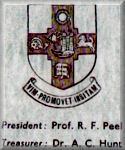
 Our
life in the village started with a bang. On the evening of our arrival we met
Mr Hinge, the District Magistrate; he was very glad we had come at last he said,
tomorrow was most important.
Our
life in the village started with a bang. On the evening of our arrival we met
Mr Hinge, the District Magistrate; he was very glad we had come at last he said,
tomorrow was most important. 